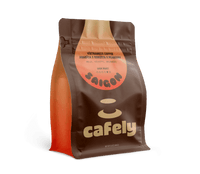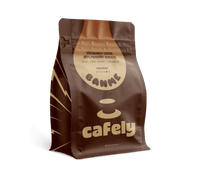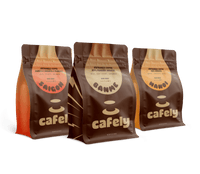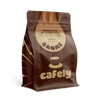In most cases, people feel coffee’s stimulating and energizing effects for around four to six hours after consumption. Until these effects wear off, it may be challenging to sleep, as your adrenaline will be high, giving you too much energy to relax and wind down.
But even after these effects wear off, caffeine’s likely still in your system. Caffeine has a half-life of around five hours, which means that half the dose is still in your body after five hours.
Caffeine Dosage
Of course, the amount of caffeine in coffee will play a role in how long it keeps you awake. One relatively weak cup of coffee is not likely to keep most people awake. But if you have several cups of the strongest types of coffee, it may interrupt your normal sleep schedule.
The amount of caffeine also impacts how intense the effects are. In some cases, you may only experience a subtle boost to your alertness or focus. But if you take a huge amount, you may be completely wired and jittery for a while, making it nearly impossible to sleep peacefully.
Caffeine Metabolic Differences
How quickly you metabolize caffeine also determines how long it keeps you awake and how intense the effects are. People who metabolize caffeine quickly probably won’t experience many problems sleeping after consuming coffee, whereas those who metabolize it slowly won’t be as tolerant.
Several factors can influence how long it takes your body to metabolize caffeine, such as your age, liver function, genetics, and whether you’re taking any medications. So, if you’re wondering why caffeine doesn’t affect you, it’s likely due to one of these factors.
Why Does Coffee Keep You Awake?
Now that you know how long caffeine keeps you awake, how does it keep you up in the first place? Caffeine is a stimulant that also blocks the production of adenosine, a chemical in your brain that promotes sleep [1]. This tricks your brain into feeling more alert and less tired than it is.
However, caffeine also increases your adrenaline and heart rate [2]. Some researchers believe it may even delay the release of melatonin in the body, a hormone that regulates your sleep-wake cycles [3].
As you can imagine, these effects all contribute to why sleeping and relaxing are tough after consuming caffeine, even if it’s been hours after your last sip of coffee.
How Late Is Too Late to Have Coffee?

Speaking of your last sip of coffee, what time of the day should you have your final cup? Well, a good rule for most people is to avoid caffeine within six to eight hours of going to bed.
For example, if you normally go to sleep at 10 pm, you should likely stop consuming caffeine sometime between 2 and 4 pm. If you’re not the best sleeper and often have issues falling or staying asleep, stop near the earlier portion of this range.
Tolerance Varies
Of course, caffeine sensitivity and tolerance vary from person to person. Some people can grind up coffee beans and have a cup right before winding down for bed, while others need to stop drinking coffee by the time the morning ends to avoid sleeping troubles.
If you’re unsure about your sensitivity, avoid caffeine at least six to eight hours before sleep. If you don’t experience any issues, you could try to have coffee later in the day to see how you react.
How Much Coffee Is Safe to Drink?
In addition to keeping track of when you drink coffee, it’s also a good idea to track how much you’re drinking. For healthy adults, the Food and Drug Administration (FDA) recommends a maximum of 400 mg of caffeine per day. This is around four or five regular cups of coffee, though caffeine levels vary from bean to bean.
Keep in mind that this amount is for healthy adults, so if you have any health issues or conditions, the right amount for you may vary. If you’re concerned about how much coffee is safe to consume, contact a healthcare professional or trusted expert.
What Happens if You Have Too Much Coffee?
If you drink too much coffee throughout the day, you may experience some adverse side effects. You may get anxious, feel jittery, and even experience heart palpitations. Of course, you may also struggle to fall asleep or have poor sleep in general.
Over time, if you consistently consume too much, you may also develop a dependency. If you become dependent on caffeine and then abruptly stop your consumption (even just for a short period), you may experience symptoms like headaches, fatigue, and general irritability.
Other Drinks & Foods That May Keep You Awake
When people think of caffeine, their minds often go straight to coffee. While it’s among the most popular ways to get your caffeine fix, coffee is far from the only available option.
In fact, several other types of food and drinks may keep you awake thanks to high caffeine content.
Drinks That May Contain Caffeine
If you’re worried about caffeine consumption, you’ll want to avoid other common caffeinated beverages before sleep, including:
- Energy drinks
- Kombucha
- Tea
- Yerba mate
- Guarana drinks
- Cola
- Mountain Dew
- Dr. Pepper
- Root beer
Thankfully, many of these beverages come in caffeine-free varieties. Also, many pre-workout supplements may be full of caffeine to give you energy and help you focus during a workout.
Foods That May Contain Caffeine

Similar to beverages, you may be surprised to learn a variety of foods contain caffeine. For example, many chocolate types often contain notable caffeine, as do many mocha or coffee-flavored cakes, desserts, candy, or ice cream. Even some chocolate-flavored cereals may have a sneaky little bit of caffeine inside.
Companies also add caffeine to many products like jelly beans, chewing gum, snack bars, and more.
Other Ways to Stay Alert & Energetic Throughout the Day
If you still want to remain focused and energetic throughout the day without relying on caffeine, you have several options.
- Hydrate well: If you don’t get enough water, it can make you feel fatigued. By drinking throughout the day, you’re helping yourself feel more alert.
- Get outside:Exposure to the bright sun can help regulate your body’s clock and also help to produce more serotonin, a chemical in the body that regulates your mood and improves your focus [4].
- Get moving:It’s easy to get tired and worn out if you just sit at your desk all day. Moving your body with stretching or walking can help you feel more alert.
- Cold water: There's nothing like a cold shower or a splash of cold water to wake you up and energize you when you're feeling a little tired or sluggish. Also, drinking a glass of ice-cold water can stimulate adrenaline in your body, providing a natural pick-me-up.
- Use natural alternatives: There are many natural substances and plants that you can take to help deal with fatigue. These include ginseng, rhodiola, eleuthero, and others.
- Eat the right foods: If you eat energizing snacks throughout the day, it can help you stay more focused and alert. Look for foods high in protein, healthy fats, and complex carbs.
FAQs: How Long Does Coffee Keep You Awake
Here are a few common questions about how long coffee and caffeine keep you awake, along with their answers.
1. How Long Will You Feel the Effects of Coffee/Caffeine?
While it varies for everyone, many people will feel the effects of caffeine for around four to six hours after consuming coffee.
2. How Late Is Too Late To Consume Coffee?
In general, it’s a good idea to stop consuming coffee about six to eight hours before you sleep. However, this differs for everyone, as some people can’t have it any time after noon, while others can have it in the evening and be fine.
3. Is There a Way to Flush Caffeine Out of Your System Quicker?
While there’s no proven way to flush caffeine out of your body instantly, there are some things you can do that may help. Staying hydrated, eating a healthy and well-balanced meal, and doing light exercise can be invigorating and give you a natural boost.
4. How Much Coffee Is Safe to Drink?
According to the FDA, it’s safe for healthy adults to consume up to 400 mg of caffeine per day, generally around four or five cups of coffee.
5. Why Does Coffee Keep You Awake?
Coffee keeps you awake because it’s a stimulant that blocks adenosine, a chemical in the brain that promotes sleep. In addition to tricking the brain this way, caffeine also raises your heart rate and adrenaline, making it harder to fall asleep.
6. Does Decaf Coffee Still Keep You Awake?
Yes, decaffeinated coffee can still keep you awake. Many decaf coffees still have tiny amounts of caffeine in them, which may be enough to impact you if you’re incredibly sensitive to it.
7. Why Can I Sleep After Drinking Coffee?
Caffeine impacts everyone differently. If you’re able to sleep easily after consuming coffee, it means you can either metabolize it quicker, have a higher tolerance for caffeine, or simply experience the effects differently than other people.
8. Is Cold Brew Stronger Than Regular Coffee?
Cold brew coffee is often stronger than regular coffee as it’s brewed with more coffee beans and grounds and less water, which leads to a higher caffeine content.
9. Is Espresso Stronger Than Drip Coffee?
Yes, espresso is generally stronger than drip coffee. While a full cup of regular drip coffee may have more total caffeine than a shot of espresso, a shot of espresso will have much more caffeine than a shot of regular drip coffee.
10. How Can I Tell If Caffeine Is Affecting My Sleep?
If you find yourself struggling to fall asleep, waking up in the middle of the night, not feeling well-rested after your sleep, or being more tired than normal during the day, caffeine may be negatively impacting your sleep.
References
- Reichert, C. F., Deboer, T., & Landolt, H. (2022). Adenosine, caffeine, and sleep–wake regulation: state of the science and perspectives. Journal of Sleep Research, 31(4).
- Van Soeren, M., Mohr, T., Kjaer, M., & Graham, T. E. (1996). Acute effects of caffeine ingestion at rest in humans with impaired epinephrine responses. Journal of Applied Physiology (Bethesda, Md.: 1985), 80(3), 999–1005.
- Shilo, L., Sabbah, H., Hadari, R., Kovatz, S., Weinberg, U., Dolev, S., Dagan, Y., & Shenkman, L. (2002). The effects of coffee consumption on sleep and melatonin secretion. Sleep Medicine, 3(3), 271–273.
- Sansone, R. A., & Sansone, L. A. (2024). Sunshine, Serotonin, and Skin: A Partial Explanation for Seasonal Patterns in Psychopathology? Innovations in Clinical Neuroscience, 10(7-8), 20.









